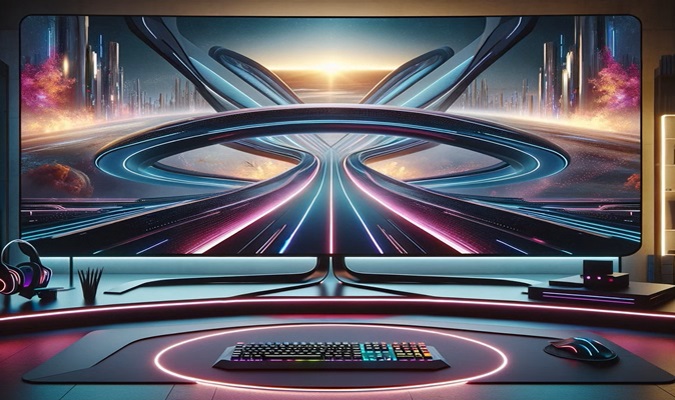A stretched screen is a setting used by some gamers. Games are typically designed for specific aspect ratios like 16:9.
When you stretch a game’s display, you’re forcing it into a different aspect ratio, like stretching a 4:3 game to fit a 16:9 monitor.
This makes objects appear wider and shorter. It’s like stretching an image horizontally.
A stretched screen is a personal preference. It might help in making targets appear larger, but it distorts the image and can affect visual quality.
Stretching the screen has no impact on the actual performance of your gaming hardware. This setting does not affect the game’s mechanics, speed, or responsiveness.This is purely a cosmetic change.
Let’s explore the advantages and disadvantages of using a stretched screen while gaming.
Advantages of Playing Games on a Stretched Screen
Easier Targeting
When the screen is stretched, enemies and objects that are normally smaller on a standard screen appear larger.
This can make aiming and shooting at these targets easier, as they take up more space on the screen.
In first-person shooter games, where precision is key, having larger apparent targets can be a significant advantage.
In games where reaction time is critical, this can be particularly helpful.
Increased Field of View
Some games may show a bit more area on the sides, giving players a wider view of the game world.
This can be advantageous in scenarios where being aware of your surroundings is crucial.
However, the effect on FOV depends on how each game is programmed to handle different aspect ratios.
Not all games will provide an expanded FOV with a stretched screen.
Familiarity for Some Gamers
Gamers who grew up playing older games on stretched screens might find this setting more natural and comforting.
Familiarity can make the gaming experience more enjoyable for them.
Some players may simply prefer the look and feel of a stretched screen, independent of any potential advantages.
Disadvantages of Playing Games on a Stretched Screen
Unnatural Proportions
Characters and environments become horizontally stretched, leading to unnatural proportions.
This distortion can be visually jarring and uncomfortable for some players.
The unnatural look can detract from the immersive experience that games aim to provide.
Blurry or Pixelated Images
Stretching the image can make it blurry or pixelated, reducing the clarity of textures and objects.
Important visual details in the game might be harder to discern.
Potential Eye Strain
Prolonged exposure to these distorted visuals can lead to discomfort, headaches, or even migraines.
Regardless of screen settings, taking regular breaks to rest your eyes and reduce strain is important for long-term eye health.
Alternatives to a Stretched Screen
Instead of stretching the screen, adjusting the FOV settings (if the game allows) can be a better way to gain a wider view without distorting the graphics.
Using a monitor with a higher resolution can improve clarity and detail without the need for stretching the screen.
Conclusion
While a stretched screen makes targets larger and offers a potentially wider FOV, it comes with drawbacks such as distorted graphics and reduced sharpness. This can impact the overall gaming experience and even cause eye strain.
The choice to use a stretched screen is largely influenced by personal preference and the specific requirements of the game you’re playing.
